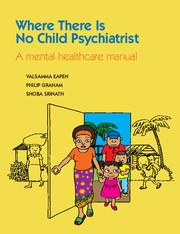Book contents
- Frontmatter
- Contents
- Preface
- Acknowledgements
- Abbreviations
- List of tables and boxes
- 1 Introduction
- 2 Assessment and treatment: general principles
- 3 Making a summary and action plan
- 4 Development and developmental problems
- 5 Intellectual disability
- 6 Habit disorders
- 7 Emotional problems
- 8 Behaviour and related problems
- 9 Specific problems in adolescence
- 10 Alcohol and drug dependency
- 11 Psychotic disorders
- 12 Chronic physical illness and disability
- 13 Physical illness without an identifiable physical explanation
- 14 Stressful situations
- 15 Parents and the needs of children
- 16 Mental health promotion
- 17 Medication
- References and suggested reading
- Appendix 1 My star chart
- Appendix 2 Guide to medication for use in childhood mental disorders
- Index
1 - Introduction
Published online by Cambridge University Press: 29 April 2024
- Frontmatter
- Contents
- Preface
- Acknowledgements
- Abbreviations
- List of tables and boxes
- 1 Introduction
- 2 Assessment and treatment: general principles
- 3 Making a summary and action plan
- 4 Development and developmental problems
- 5 Intellectual disability
- 6 Habit disorders
- 7 Emotional problems
- 8 Behaviour and related problems
- 9 Specific problems in adolescence
- 10 Alcohol and drug dependency
- 11 Psychotic disorders
- 12 Chronic physical illness and disability
- 13 Physical illness without an identifiable physical explanation
- 14 Stressful situations
- 15 Parents and the needs of children
- 16 Mental health promotion
- 17 Medication
- References and suggested reading
- Appendix 1 My star chart
- Appendix 2 Guide to medication for use in childhood mental disorders
- Index
Summary
Mental health problems in children and adolescents
What do we mean by mental health problem? The term mental health problem covers a wide range of difficulties:
• it involves the mind rather than the body
• it can be mild, moderate or severe when it causes serious disruption to the lives of the child and parents
• it is common for children to show more than one problem
• it usually has more than one cause
• it can often be assessed and managed effectively by primary healthcare professionals.
Types of mental health problems
The following are different types of mental health problem. Each of these is described in more detail later on in the manual.
• Delays and deviations from normal development
• Habit problems in the early years, especially feeding, sleeping difficulties, bed-wetting and soiling
• Emotional problems, especially anxiety and depression
• Behaviour problems, including extreme disobedience, temper tantrums, aggressive behaviour, stealing, lying, truancy and attention-deficit hyperactivity disorder (ADHD)
• Self-harm
• Mental health difficulties arising from chronic physical illnesses
• Physical symptoms for which no physical illness is found
• Severe mental disorders, especially psychoses
• Alcohol and drug dependency
• Stressful or damaging experiences, especially child abuse
• Having more than one of the above problems, which is very common.
Importance of mental health problems
Many studies of mental health problems have now been carried out in low- and middleincome (LAMI) countries. They all show that children in these countries, including, for example, India, China, the United Arab Emirates, Colombia and the Philippines, have either the same or higher rates of mental health problems than children in high-income countries. Between 1 in 5 and 1 in 10 children have mental health problems that reduce the quality of their lives at any one time.
Children with these problems are frequently seen in primary healthcare clinics, but they are often not identified by those working in such clinics. One study carried out in four LAMI countries showed that nearly 4 out of 5 children who attended clinics with mental health problems were not recognised to have such problems by the health professionals who saw them (Giel et al, 1981).
Methods that could be used by health professionals working in primary care are available that would result in effective assessment and management of such cases. We shall describe these methods later in the manual.
- Type
- Chapter
- Information
- Where There Is No Child PsychiatristA Mental Healthcare Manual, pp. 1 - 3Publisher: Royal College of PsychiatristsPrint publication year: 2012
- Creative Commons
- This content is Open Access and distributed under the terms of the Creative Commons Attribution licence CC-BY-NC-ND 4.0 https://creativecommons.org/cclicenses/



